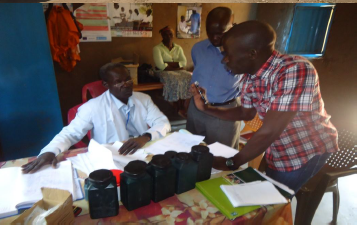The Strong Logistic Management Information System (LMIS) supports evidence-based procurement, quantification, supply planning, and financial decisions that are central to effective management of pharmaceuticals. The LMIS makes it easier for South Sudan’s Ministry of Health (MoH) to collect, process, and report on medicine consumption at the central level. However, as a country emerging from decades of war, the LMIS remains weak.
Download this article as a PDF
In South Sudan, the central and state medical stores that are used as transit stores lack proper storage facilities, inventory control system, and proper monitoring. There is still not enough trained health workers in the pharmaceutical sector, and most health facilities are not reporting their stock levels due to lack of pharmaceutical tools like stock cards, issue and receipt voucher, dispensing registers, and prescription forms. Lack of these tools in many public health facilities has challenged the implementation of good pharmaceutical management practices in the country.

The USAID-funded System for Improved Access to Pharmaceuticals and Services (SIAPS) Program has been working with the MoH to ensure the availability of pharmaceuticals and services in the country. SIAPS has been strengthening the ministry’s Logistical Management Unit (LMU) since 2013 to improve management of pharmaceuticals in the country. SIAPS has redesigned LMIS to ensure availability of standardized data collection tools required for effective monitoring and reporting on health commodities. The LMU has become a source information to the MoH and its partners—it collects, analyzes, and shares monthly reports on stock country-wide. The LMU attends bi-weekly Pharmaceutical Technical Working Group meetings to share stock status information on the MoH-approved tracer medicines.
Through LMU, SIAPS has supported the printing and dissemination of all the approved pharmaceutical tools in South Sudan. The dissemination of these tools have contributed directly to improving reporting rates. For instance, the number of states reporting their stock status has increased from one to eight states. SIAPS has also expanded the reach of LMU by upgrading what was a simple excel data analysis tool into an online web platform (dashboard) for analyzing data and reporting on the approved tracer medicines and HIV and TB commodities in the country.
The LMU has grown from one focal staff in the office to five staff members, including the Director of LMU and SIAPS-seconded staff. The LMU Director sits in on the MoH’s board meetings, which are usually chaired by the undersecretary. This allows the LMU to build the political support and efforts needed to continue carrying out its activities after SIAPS’ transition.
SIAPS has also organized a number of on-the-job pharmaceutical management trainings for key government employees in the former Central and Western Equatoria States to build local capacity.

